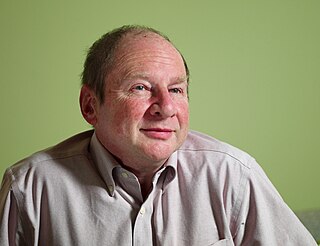
Alan Curtis Kay is an American computer scientist best known for his pioneering work on object-oriented programming and windowing graphical user interface (GUI) design. At Xerox PARC he led the design and development of the first modern windowed computer desktop interface. There he also led the development of the influential object-oriented programming language Smalltalk, both personally designing most of the early versions of the language and coining the term "object-oriented." He has been elected a Fellow of the American Academy of Arts and Sciences, the National Academy of Engineering, and the Royal Society of Arts. He received the Turing award in 2003.
Software engineering is an engineering-style system of software development. A software engineer is a person who applies the principles of software engineering to design, develop, maintain, test, and evaluate computer software. The term programmer is sometimes used as a synonym, but may also lack connotations of engineering education or skills.

Lego Mindstorms is a hardware and software structure which develops programmable robots based on Lego building blocks. Each version includes computer Lego bricks, a set of modular sensors and motors, and parts from the Lego Technic line to create the mechanical systems. The system is controlled by the Lego bricks.

Bryn Mawr College is a women's liberal arts college in Bryn Mawr, Pennsylvania. Founded as a Quaker institution in 1885, Bryn Mawr is one of the Seven Sister colleges, a group of elite, historically women's colleges in the United States, and the Tri-College Consortium along with Haverford College and Swarthmore College. Finally, it is one of 15 Quaker colleges in the United States. The college has an enrollment of about 1,350 undergraduate students and 450 graduate students. It was the first women's college to offer graduate education through a PhD.

The School of Computer Science (SCS) at Carnegie Mellon University in Pittsburgh, Pennsylvania, US is a school for computer science established in 1988. It has been consistently ranked among the top computer science programs over the decades. As of 2022 U.S. News & World Report ranks the graduate program as tied for second with Stanford University and University of California, Berkeley. It is ranked second in the United States on Computer Science Open Rankings, which combines scores from multiple independent rankings.
Educational software is a term used for any computer software which is made for an educational purpose. It encompasses different ranges from language learning software to classroom management software to reference software. The purpose of all this software is to make some part of education more effective and efficient.

Harold Abelson is the Class of 1922 Professor of Computer Science and Engineering in the Department of Electrical Engineering and Computer Science at the Massachusetts Institute of Technology (MIT), a founding director of both Creative Commons and the Free Software Foundation, creator of the MIT App Inventor platform, and co-author of the widely-used textbook The Structure and Interpretation of Computer Programs, sometimes also referred to as "the wizard book."

Karachi Institute of Economics and Technology (KIET) (Urdu: درسگاہِ کراچی برائے علومِ معاشیات و فنونِ سائنسی) was established in 1997. KIET received recognition by the Higher Education Commission (formerly named UGC) vide letter no. 15-22/UGC-SEC/97/1291 dated 1 August 1998. HEC ranks KIET as 8th best university in Business/IT category.

The College of Computing is a college of the Georgia Institute of Technology, a public research university in Atlanta, Georgia. It is divided into four schools: the School of Computer Science, the School of Interactive Computing, the School of Computational Science & Engineering, and the School of Cybersecurity and Privacy. The College of Computing's programs are consistently ranked among the top 10 computing programs in the nation. In 2022, U.S. News & World Report ranked the Computer Science graduate program #6 in the U.S. In 2016, Times Higher Education and the Wall Street Journal ranked the College #5 in the world.
Ekaterini Panagiotou Sycara is a Greek computer scientist. She is an Edward Fredkin Research Professor of Robotics in the Robotics Institute, School of Computer Science at Carnegie Mellon University internationally known for her research in artificial intelligence, particularly in the fields of negotiation, autonomous agents and multi-agent systems. She directs the Advanced Agent-Robotics Technology Lab at Robotics Institute, Carnegie Mellon University. She also serves as academic advisor for PhD students at both Robotics Institute and Tepper School of Business.

Mark Joseph Guzdial is a Professor in the College of Engineering at the University of Michigan. He was formerly a professor in the School of Interactive Computing at the Georgia Institute of Technology affiliated with the College of Computing and the GVU Center. He has conducted research in the fields of computer science education and the learning sciences and internationally in the field of Information Technology. From 2001–2003, he was selected to be an ACM Distinguished Lecturer, and in 2007 he was appointed Vice-Chair of the ACM Education Board Council. He was the original developer of the CoWeb, one of the earliest wiki engines, which was implemented in Squeak and has been in use at institutions of higher education since 1998. He is the inventor of the Media Computation approach to learning introductory computing, which uses contextualized computing education to attract and retain students.
Python Robotics (Pyro) is a project designed to create an easy-to-use interface for accessing and controlling a wide variety of real and simulated robots.

The Scribbler is a small, low-cost fully programmable intelligent robot with multiple sensor systems. It is capable of auto navigation and interaction with its environment.
Educational robotics teaches the design, analysis, application and operation of robots. Robots include articulated robots, mobile robots or autonomous vehicles. Educational robotics can be taught from elementary school to graduate programs. Robotics may also be used to motivate and facilitate the instruction other, often foundational, topics such as computer programming, artificial intelligence or engineering design.

The Micro Bit is an open source hardware ARM-based embedded system designed by the BBC for use in computer education in the United Kingdom. It was first announced on the launch of BBC's Make It Digital campaign on 12 March 2015 with the intent of delivering 1 million devices to pupils in the UK. The final device design and features were unveiled on 6 July 2015 whereas actual delivery of devices, initially planned for September 2015 to schools and October 2015 to general public, began on 10 February 2016.
Robotic process automation (RPA) is a form of business process automation technology based on metaphorical software robots (bots) or on artificial intelligence (AI)/digital workers. It is sometimes referred to as software robotics.
Martha Evens is an emeritus professor at the Illinois Institute of Technology. She worked on the first spelling correction program at MIT Lincoln Laboratory in the late 1950s. Evens was president of the Association for Computational Linguistics in 1984.
EarSketch is a free educational programming environment. Its core purpose is to teach coding in two widely used languages, Python and JavaScript, through music composing and remixing. This learning environment was developed first at Georgia Institute of Technology under Prof. Jason Freeman and Prof. Brian Magerko.
Isabel Fothergill Smith was a geology professor from Greeley, Colorado. She studied geology at Bryn Mawr College under her mentor Florence Bascom. Smith published various articles as a student and a memoir on Bascom later during her retirement. Beginning her career as an associate professor of geology at Smith College, Isabel later became the first dean of Scripps College, a prestigious women's liberal arts college.










